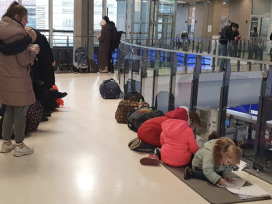
A leading Ukrainian-American writer on grace, justice, power and freedom.
Not all Serbs are the same, writes painter and actor Uros Djuric. Slavenka Drakulic uncritically reduces the problem to one self-explanatory category and is an example of a “culturally racist matrix”.
When I think about Drakulic’s article, and considering the fact that Politika asked me to comment on it, I cannot help but think of a popular science book by Eric Berne on transactional analysis, The Games People Play (In Serbian translated as “What game are you playing?”). I think that today’s generations have the right to ask members of the intellectual, political and public scene of the war-torn former Yugoslavia, and especially those who act as if they had divine characteristics when it comes to moral responsibility, this very question: “What game are you playing?”
[…]
It is hard to understand that the fragment on Vladimir Arsenijevic was written by the very same person who had been forced to flee Croatia in 1992 after Slaven Letica published an article in the weekly Globus attacking her for the fact that in a previous article on the war, she had referred to rape not as a military tactic used by Serbs against non-Serbs, but from a feminist point of view, as a crime committed by “unidentified men” against women.
Also, to refuse to presume that generations born after 1991 are innocent for what happened during the civil war falls not under the category of clouded mind, but of top-level malice. It would be interesting to demand from everybody born after 1991, while they are applying for a visa or crossing a border, that they ask their parents the painful question: “What did you do during the 1990s wars?” – before they grow up and become independent and free-minded persons and solve the puzzle themselves. According to Slavenka Drakulic, they should, calling on their conscience, try to piece the pieces of the jigsaw together themselves, because they will be awarded the freedom of movement. The attitude that “unfortunately, Serbs live in denial of their recent past” and that “the problem is that there seems to be no desire in society to find out the truth” doesn’t deserve many words being wasted on it.
Yes, Serbian society shows a tendency of indifference towards the truth, and yes, many Serbs live in denial of their recent past. But not all the Serbs and all the segments of the society, nor even the majority fits this pattern. This shameless, uncritical reduction to one self-explanatory category (the Serbs, i.e. Serbian society) is a stereotyped example of a culturally racist matrix.
It is also unclear why easy recognizable persons such as Zarana Papic, Dunja Blazevic, Aleksandrar Tijanic, Milorad Vucelic are hidden behind general names and titles. Really, what is this all about? What games do people play? According to transactional analysis, we sometimes disarrange – that is, redefine – our perception of reality so it can fit our script. One way to make sure that the world seems as if it fits our script is to unconsciously, unintentionally, selectively ignore information: that is called discounting. Slavenka’s Belgrade has hardly anything in common with the real one, which is even worse than she imagines. But then again, Berlin is not all that it’s cracked up to be. Nor is Paris. And this goes for the majority of the planet in the last twenty years. It’s no longer the same society. Leftwing and rightwing are getting closer to the centre, the effects of the Second World War are being annulled, history is being revised, general social insecurity dominates, conflict areas are generated so that military interventions can take place. It is as difficult for me to live in Belgrade as it is for her to visit. But we are talking about something different here.
I remember Slavenka Drakulic as an established, media-attractive, passionate, controversial, pro-left and pro-feminist columnist in Start, a sociologist, a frequent participant on speaker’s platforms, a die-hard opinion maker. She was considered to have a faster mouth than brain in a polemical discourse, and keen to provoke as a part of a strategy to argue certain points of view.
In this gracelessly assembled Belgrade-Serbian case, the paracritically coloured auto-reflection begins with an analysis of her attitude towards an event that “triggered the familiar feeling of anxiety” and turns into the charge that “the young generation of today’s Serbia is suffering isolation because of the only thing it should do and is not doing asking questions.” Hence her triumphal conclusion: “This, I believe, is why I have not visited Belgrade for so long. I could not bear their silence and denial, as I could not accept it in my own country.”
I am sorry, but this still sounds like an excuse, no less than the previous ones, the only difference being that a solely personal act has been turned into a public verdict upon a whole community in all its complexity. This community, due to the undeniable burdens resulting from its often bloody trauma, has enough to deal with as it is.
Published 3 April 2009
Original in Serbian
Translated by
Alma Memic-Avdic
First published by Politika 28.03.2009 (Serbian version)
© Uros Djuric / Eurozine
PDF/PRINTSubscribe to know what’s worth thinking about.

A leading Ukrainian-American writer on grace, justice, power and freedom.

Remaining in a new country or returning home? The Knowledgeable Youth podcast delves into the complex decision-making refugees face when migrating, together with researcher Olena Yermakova.